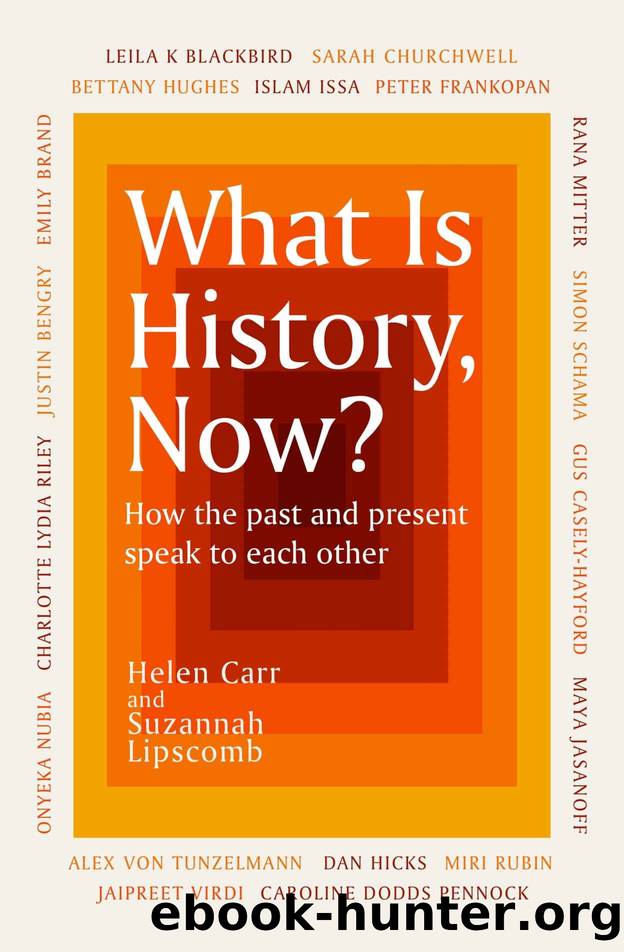What Is History, Now? by Suzannah Lipscomb & Helen Carr

Author:Suzannah Lipscomb & Helen Carr [Lipscomb, Suzannah]
Language: eng
Format: epub
ISBN: 9781474622486
Publisher: Orion
Published: 2021-09-22T21:00:00+00:00
Chapter 10
Why diversity in Tudor England matters
Onyeka Nubia
Historians have sometimes found it appropriate to envisage English history as a book with white pages and no Black letters in. And historians often write a narrative where Africans and other people of colour are automatically the âotherâ, âstrangerâ, âJohnny-come-latelyâ or âthe enslavedâ. This distortion skews our understanding of English history and makes it difficult to see Africans as active participants in Englandâs story.
Moreover, Tudor history is a popular preoccupation, and often it is here where Africans are assigned tropes that explain away their significance. For example, Kenneth Little in Negroes in Britain (1947) wrote that he doubted âif the Blackman whether of African or East Indian origin was a familiar figure [in England] until well on in the [sixteenth] century, except as a chance visitor or when imported from Portuguese and colonial territories [in Africa and the Caribbean].â These words âfamiliar figureâ and âimportedâ in the quotation above suggests that Little thinks there were very few Africans present in Tudor England, and that those who were there were enslaved and âpropertyâ, belonging to Europeans. Littleâs statements are simple and reductionist, but his sentiments are echoed by more recent historians such as Kim Hall. The trajectory of her book is insightful, but unfortunately she repeats similar notions that Africans in Tudor England were marginal and inconsequential, âtoo accidental and solitary to be given a historical statisticâ. Hall implies that their presence was not significant enough to warrant any serious academic analysis or public recognition. But recent research has revealed that African people can be retrieved from English records, and their presence, status and significance disrupt established historical narratives. The existence of these Africans offers a challenge to narratives of Englishness that continue to ignore or marginalise them.
To understand the status and contribution of Africans in Tudor England it is helpful to recognise that racism has not always been institutionalised or systematised. Some of the reasons for this are that Tudor England did not inherit from its medieval past race laws, conventions or customs that determined peopleâs status by their colour. Race laws emerged in England at the end of the seventeenth and into the eighteenth century. They were supported because of the economic profits engendered from colonialism and enslavement. These profits created an economic imperative that made racism institutionally necessary. It is at this time that African people were stigmatised as less than human in many parts of the world. Proponents within anthropology and other sciences, as well as theology, supported this. And intellectuals that included Carl Linnaeus, Immanuel Kant, Erasmus Darwin and Josiah C. Nott helped to institutionalise quasi-scientific and philosophical theories that promulgated inequality. Meanwhile, European lawyers refashioned the slave laws and customs of antiquity, pilfered from Greek and Roman apologists such as Aristotle, Euripides, Plutarch and Cicero. And these lawyers originated monstrous social and legal conventions, which denied humanity to Africans. These conventions became woven into the fabric of seventeenth, eighteenth and nineteenth-century British societies. They made being English exclusive and white.
Download
This site does not store any files on its server. We only index and link to content provided by other sites. Please contact the content providers to delete copyright contents if any and email us, we'll remove relevant links or contents immediately.
The World Almanac and Book of Facts 2021 by Sarah Janssen(880)
The emperor wears no clothes by Jack Herer(383)
The Way Home by Unknown(351)
The Crises of Civilization by Dipesh Chakrabarty(329)
History of India: A History In 50 Events by Hourly History(291)
Darius in the Shadow of Alexander by Pierre Briant(286)
Hidden Links by Zac Sangeeth & Sangeeth Varghese(271)
A Military History of the Cold War, 1962â1991 by Jonathan M. House(266)
The History of Human Marriage by Edward Westermarck(265)
Prehistoric Europe by Champion Timothy. Whittle Alasdair. Shennan Stephen. Gamble Clive(255)
Flood Legends: Global Clues of a Common Event by Charles Martin(253)
History of the Jews: An Enthralling Guide from Ancient Times to the Present (Religion in Past Times) by Wellman Billy(240)
Chinese History: 500 Interesting Facts About China (Curious Histories Collection) by Ahoy Publications(226)
Big Tent by Mallory Factor(215)
The Education of Historians for Twenty-First Century by Thomas Bender; Philip F. Katz; Colin A. Palmer(212)
Mark Of The Scots - Cl by Duncan A. Bruce(206)
The Philosophy of Historiography by John Lange(205)
Other Pasts, Different Presents, Alternative Futures by Jeremy Black(202)
Ancient Roman Sports, A-Z : Athletes, Venues, Events and Terms by David Matz(195)
